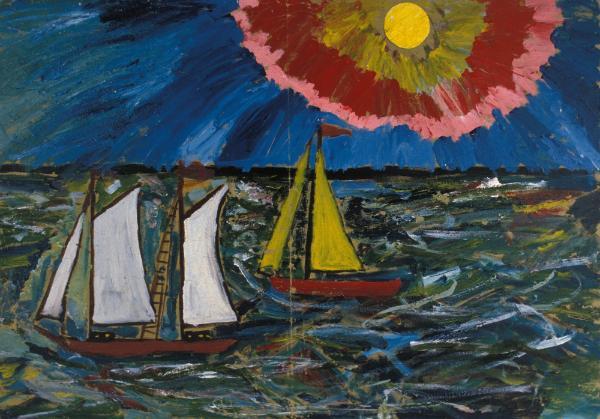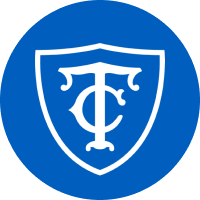Embarking on Your Research Journey
The Framework for Information Literacy in Our Workshops

Image: Ships at Sea from the The Ziegfeld Collection of International Children's Art, Courtesy of Gottesman Libraries, Teachers College, Columbia University
As we look forward to our first workshop in the new series Your Research Journey: The Foundations of Library Research, we would like to lay out our inspiration and goals for this evergreen workshop series.
Gottesman Libraries has a long history of offering workshops on key research skills, tools, and information. From cited reference searching to academic integrity, our workshops have addressed a variety of needs across Teachers College. With our new workshop series, these ideas and more will be organized into five rotating sessions that address foundational skills throughout the semester and beyond. The five workshops are built to guide you through your research journey, but you can enter and exit the series at any point, as it repeats with every cycle of the 5 workshops. The series includes: Charting Your Path: An Introduction to Library Research, Managing Your Citations with Zotero, Advanced Searching Strategies, Finding and Understanding Sources, and The Literature Review.
A key inspiration for each session comes from the Association of College and Research Libraries publication the Framework for Information Literacy for Higher Education. This framework distills essential skills needed to understand and process information and knowledge into 5 frames. The frames are not hierarchical and they do not have a designated order. Some examples of the frames are “Scholarship as Conversation” and “Information has value”–statements that speak to conceptual approaches to information processing and creation. They have overlapping interests and goals, making the entire framework a dynamic and fluid set of concepts. The frames are accompanied by associated practices for individual learners as well as the dispositions that demonstrate the behaviors learners adept in each frame might exhibit.
Threshold Concepts
The framework is based on the idea of threshold concepts, “those ideas in any discipline that are passageways or portals to enlarged understanding or ways of thinking and practicing within that discipline.” (Framework, pg. 7). There are individual threshold concepts within specific disciplines. One example from the field of history is the concept that history is a constructed narrative (Center for Engaged Learning). When students and scholars of history reach an understanding of this concept, they open up more and more ways of knowing within the discipline. This is just one of many threshold concepts both in history and wider learning.
The frames in the ACRL framework serve as broad threshold concepts in the study and practice of working with and creating information resources, a typical goal in the academic world. We seek to find a common ground in these statements, as a clear understanding of our view on information can create a cohesive approach to learning and research.
The Framework in Practice
In our workshop series, we are using the framework as an organizing force for each session. Each frame serves as a guiding principle to build on the subjects specifically relevant to the Teachers College community. Luckily, the frames fit quite well into our past workshop offerings. By standardizing these offerings under the umbrella of the framework in an evergreen format, we are able to more explicitly provide workshops that lead to sustained practices of information literacy.
We have associated one to two frames with each workshop, but lines between each are not rigid. For example, the workshop The Literature Review focuses on the frame Information Creation as Process, as the literature review procedures are a key way that information is created in many disciplines at TC. However, the literature review process also speaks to the frame Scholarship as Conversation–with an emphasis on utilizing and synthesizing works by key authors in a field when conducting a review. In each case, we won’t explicitly mention the framework during the workshop, but rather utilizing them as deeper understanding we hope attendees will walk away from the workshop having grasped.
Considerations
While useful in crafting a holistic approach to information literacy instruction, the Library staff reviews the literature surrounding the topic and is mindful of certain aspects of the framework. . Firstly, the framework started development in 2013 and was published in 2015. As the world of information continually grows and proliferates faster and faster, the span of 10 years since its initial development to the present day prompts us to think of ways that information retrieval and understanding has changed in that time. This means that the framework can often serve not as an end point, but as a starting point to discuss information literacy in context with newly developing technologies, global events, critical understandings and more. Keeping up to date with developments in information literacy work is paramount to our goals.
Additionally, top of mind for us is promoting awareness of different ways of knowing and conceptualizing information. While the ACRL Framework seeks to be as widely applicable as possible, there are settings and environments in which we need to think outside of the framework to make real change. Learners and practitioners of information literacy may need to bend or break the tenets of the frames with changing understandings of what constitutes literacy. This also includes recognizing that the basis for our information as it stands is “a reflection of a specific distribution of power” in our society that should be critically reflected upon (Beyond the Threshold: Conformity, Resistance, and the ACRL Information Literacy Framework for Higher Education by Ian Beilin)
Beyond the Framework
Concurrent with our evergreen series on getting started in research, we will also be offering dynamic workshops that deepen and expand upon the concepts in the foundational workshops, and may grapple with some of the above considerations. The Elevate Your Research Workshop Series will bring explorations of primary sources, data, collaboration and more to continue growing your relationship with knowledge production and information literacy.
With the incredibly vital research and learning being conducted at Teachers College, we hope this new workshop series will serve as a strong support for the community. If you have questions, recommendations, or suggestions for our utilization of the framework or future workshops, please feel free to reach out through Ask a Librarian. We are always eager to engage in conversations about learning through information literacy! We hope you will join us for both of our new workshop series: Your Research Journey and Elevate Your Research. Check our Events page for more information and to register for upcoming workshops.



